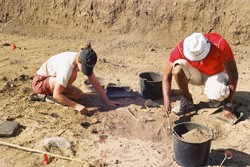Training for slavery research
The EU-funded EUROTAST(opens in new window) (A European initial training network on the history, archaeology, and new genetics of the trans-Atlantic slave trade) project supported research on the title theme. The interdisciplinary network comprised 13 early-stage researchers, who studied aspects of the slave trade, including origins and ancestral ties, life cycles, legacies and representations. Two experienced researchers dealt with dissemination and public engagement. All 15 recruits were hired within a few months of each other so that training could be conducted as a single group. EUROTAST organised several training workshops, covering both research and general skills topics. Other events included conferences and four symposia, each hosting internationally renowned guest speakers. The effort has resulted in a close community of researchers better equipped to contribute to the European Research Area (ERA). EUROTAST also scheduled visitation events to Ghana and Senegal. Researchers hence gained insights into the legacy of the former Atlantic slave trade, and participated in discussions with local scholars. The final event consisted of academic presentations at the International Museum of Slavery in Liverpool, the United Kingdom. Research yielded 49 papers. A major highlight was the first proof that genetic data can be used to trace the origins of enslaved Africans. The team developed a software application for generating reliable gene sequence data from ancient remains. Other outcomes include the first demonstration that genomic and dental protein data taken from human remains can illustrate the diet and health of slaves. Lastly, the project formed a consortium that created a database of West African genetic samples. The EUROTAST project's training network fostered research into the history of the trans-Atlantic slave trade. The tools provided to the research community also help shed light on that period.



